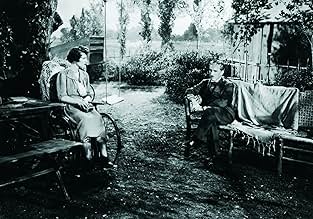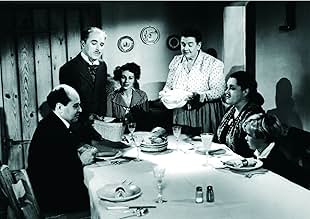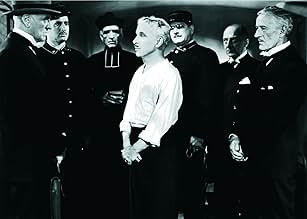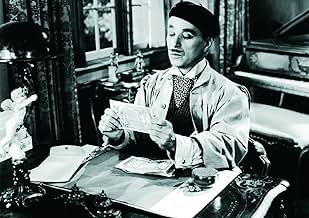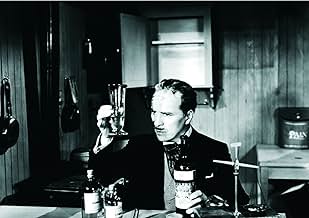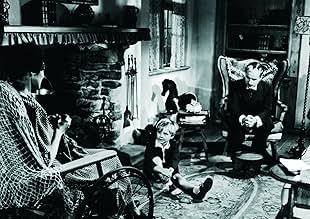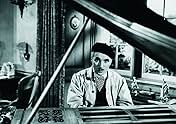AVALIAÇÃO DA IMDb
7,8/10
20 mil
SUA AVALIAÇÃO
Um homem afável, mas cínico sustenta sua família casando-se e assassinando mulheres ricas por seu dinheiro, mas o trabalho tem alguns riscos ocupacionais.Um homem afável, mas cínico sustenta sua família casando-se e assassinando mulheres ricas por seu dinheiro, mas o trabalho tem alguns riscos ocupacionais.Um homem afável, mas cínico sustenta sua família casando-se e assassinando mulheres ricas por seu dinheiro, mas o trabalho tem alguns riscos ocupacionais.
- Direção
- Roteiristas
- Artistas
- Indicado a 1 Oscar
- 6 vitórias e 1 indicação no total
Ada May
- Annette - Her Maid
- (as Ada-May)
Bernard Nedell
- Prefect of Police
- (as Bernard J. Nedell)
- Direção
- Roteiristas
- Elenco e equipe completos
- Produção, bilheteria e muito mais no IMDbPro
Avaliações em destaque
A suave but cynical man (Charles Chaplin) supports his family by marrying and murdering rich women for their money, but the job has some occupational hazards.
This film is brilliant, because it is not just entertaining, but also has a strong message. On the surface, it is a man who marries women and kills them in order to get their money. This in itself makes for a good film (and is somewhat risqué for the 1940s). But then, it is also a metaphor for society -- capitalism, imperialism, war... Chaplin takes on the Great Depression and the war industry.
Most people know Chaplin for his silent films and tramp character, but he really became a strong filmmaker in his later years. This film, along with "Great Dictator" and "King in New York" are among his best works. It is a shame that for whatever reason he is not remembered for the second half of his career.
This film is brilliant, because it is not just entertaining, but also has a strong message. On the surface, it is a man who marries women and kills them in order to get their money. This in itself makes for a good film (and is somewhat risqué for the 1940s). But then, it is also a metaphor for society -- capitalism, imperialism, war... Chaplin takes on the Great Depression and the war industry.
Most people know Chaplin for his silent films and tramp character, but he really became a strong filmmaker in his later years. This film, along with "Great Dictator" and "King in New York" are among his best works. It is a shame that for whatever reason he is not remembered for the second half of his career.
This movie is a fine example of a genre which attained enormous popularity during and in the decade after World War Two. These so-called "black comedies" (a term perhaps alluding to the funereal subject matter, ranging from fluffy (Noel Coward's "Bithe Spirit" - on stage in 1941, filmed in 1945) to darkly absurd (Ealing's "The Ladykillers" in 1955), turned death into situation comedy. Falling out of favour in the 60s, black comedy returned somewhat in the work of Robert Altman, before being brought back to full glory by the Coen Brothers.
Although the most enduringly successful example of black comedy is perhaps "Arsenic and Old Lace" (stage 1941/film 1944), two of the very greatest filmmakers blessed it with their contributions. Alfred Hitchcock to some extent incarnated the essence of it every time he introduced an episode of "Alfred Hitchcock Presents", but his definitive statement - "The Trouble with Harry" - just preceded the TV shows in 1955.
Charles Chaplin's dark vision, "Monsieur Verdoux", was released in 1947, just before the anti-Communist cries against him were to drive him out of America. A political backdrop is either entirely absent or implicit in the other examples of the genre I've mentioned, but Chaplin makes it explicit, and some might say that, to some extent, this unbalances the last reel of an otherwise utterly brilliant film. Others perhaps will be more sympathetic to the historical context. For me, while completely supporting Chaplin's observations concerning the business of war, the heavy underlining of his message does seem a flaw when viewing the film today.
All the same, "Monsieur Verdoux" is a magnificent achievement, not least in its wonderful gallery of characters, many played by character actors rarely seen on screen. Two in particular stand out, both playing wives of the much-married Verdoux: dour, unsmiling Margaret Hoffman, who goes to her death in an extraordinary scene of darkness followed by sudden light; and Martha Raye, in her best cinematic role, as the wife Verdoux fails to kill. Raye is such an explosion of energy and personality that the screen can barely contain her. To watch her and Chaplin in their scenes together is sheer joy.
The script is witty, the photography excellent, and Chaplin's penchant for sentimentality is held well in check. It is, except for the end, an unusually subtle movie, its tone completely in keeping with its French setting.
Although the most enduringly successful example of black comedy is perhaps "Arsenic and Old Lace" (stage 1941/film 1944), two of the very greatest filmmakers blessed it with their contributions. Alfred Hitchcock to some extent incarnated the essence of it every time he introduced an episode of "Alfred Hitchcock Presents", but his definitive statement - "The Trouble with Harry" - just preceded the TV shows in 1955.
Charles Chaplin's dark vision, "Monsieur Verdoux", was released in 1947, just before the anti-Communist cries against him were to drive him out of America. A political backdrop is either entirely absent or implicit in the other examples of the genre I've mentioned, but Chaplin makes it explicit, and some might say that, to some extent, this unbalances the last reel of an otherwise utterly brilliant film. Others perhaps will be more sympathetic to the historical context. For me, while completely supporting Chaplin's observations concerning the business of war, the heavy underlining of his message does seem a flaw when viewing the film today.
All the same, "Monsieur Verdoux" is a magnificent achievement, not least in its wonderful gallery of characters, many played by character actors rarely seen on screen. Two in particular stand out, both playing wives of the much-married Verdoux: dour, unsmiling Margaret Hoffman, who goes to her death in an extraordinary scene of darkness followed by sudden light; and Martha Raye, in her best cinematic role, as the wife Verdoux fails to kill. Raye is such an explosion of energy and personality that the screen can barely contain her. To watch her and Chaplin in their scenes together is sheer joy.
The script is witty, the photography excellent, and Chaplin's penchant for sentimentality is held well in check. It is, except for the end, an unusually subtle movie, its tone completely in keeping with its French setting.
In his autobiography Charles Chaplin called this film his "cleverest and most brilliant" comedy, yet very few people at the time the movie was released shared this view. It was the first Chaplin US failure both with critics and audiences (though in Europe the film did quite well).
Here Chaplin plays Henri Verdoux, a serial killer who makes his living by marrying and murdering lonely reach women. Chaplin softened his character by making him a lifelong bank clerk who was laid off at the age when it was already too late to start life anew, meanwhile he has a family to support (a small son and an invalid wife). He's caught and put to trial where he accuses a hypocritical society of sanctioned mass murders and describes himself as an amateur in the field. Originally the idea belonged to Orson Welles who wanted to make a movie based on the story of a notorious murderer Henri Landru, a Frenchman who was executed in 1922 for murdering 8 women. Welles asked Chaplin to star in his film but the latter refused as he thought it was too late for him to play in a movie directed by someone else. But he bought the original idea from Welles and made what could have been a detective story or a thriller into a black comedy. It was certainly provocative and its sarcastic and ironic gravity was astonishing for the time. There is a scene, for instance, when Verdoux while waiting for the execution, talks to a journalist and pronounces the words that still fill me with horror (as they are as true nowadays as they had been fifty years ago):"Wars, conflicts - it's all business. One murder makes a villain; millions a hero. Numbers sanctify." Yet "Monsieur Verdoux" which is generally known as the most pessimistic of Chaplin films is not devoided of humour. On the contrary, at some moments it's extraordinary funny: take for instance the famous scenes with his "wives" (Annabella or Lydia)or those with madam Grosnay (my favourite bit is when Verdoux is talking to her from a flower shop, the look at the flower girl's face is wonderful!). I believe the film is one of the best I've ever seen and I highly recommend it to everyone.
Here Chaplin plays Henri Verdoux, a serial killer who makes his living by marrying and murdering lonely reach women. Chaplin softened his character by making him a lifelong bank clerk who was laid off at the age when it was already too late to start life anew, meanwhile he has a family to support (a small son and an invalid wife). He's caught and put to trial where he accuses a hypocritical society of sanctioned mass murders and describes himself as an amateur in the field. Originally the idea belonged to Orson Welles who wanted to make a movie based on the story of a notorious murderer Henri Landru, a Frenchman who was executed in 1922 for murdering 8 women. Welles asked Chaplin to star in his film but the latter refused as he thought it was too late for him to play in a movie directed by someone else. But he bought the original idea from Welles and made what could have been a detective story or a thriller into a black comedy. It was certainly provocative and its sarcastic and ironic gravity was astonishing for the time. There is a scene, for instance, when Verdoux while waiting for the execution, talks to a journalist and pronounces the words that still fill me with horror (as they are as true nowadays as they had been fifty years ago):"Wars, conflicts - it's all business. One murder makes a villain; millions a hero. Numbers sanctify." Yet "Monsieur Verdoux" which is generally known as the most pessimistic of Chaplin films is not devoided of humour. On the contrary, at some moments it's extraordinary funny: take for instance the famous scenes with his "wives" (Annabella or Lydia)or those with madam Grosnay (my favourite bit is when Verdoux is talking to her from a flower shop, the look at the flower girl's face is wonderful!). I believe the film is one of the best I've ever seen and I highly recommend it to everyone.
Charlie Chaplin is "Monsieur Verdoux" in this 1947 film based on the real-life serial killer Henri Landru.
Verdoux is a bank clerk who is laid off late in life and turns to marrying and killing women for their money in order to support his invalid wife and child.
Sounds brutal, and when you think about it, it really is, but Chaplin as usual manages to couch his message in comedy. While we see that he is successful in knocking off a couple of women and getting their money (though we never actually see a murder), Verdoux has a couple of failures as well, and there the fun begins.
One of his women, Annabella Bonheur, is played hysterically by Martha Raye as a vulgar loudmouth eternally suspicious of Verdoux, who is posing as a boat captain. He tries some different ways of killing her, but no matter what he does, nothing works.
He then turns his attention to another woman he's been chasing for some time, Marie Grosnay (Isobel Elsom). He's about to walk down the aisle when who does he see as a guest at the wedding - Annabelle. His attempts to get out of the house are priceless.
Despite some genuinely comical scenes, the speech that Verdoux makes gives its deeper message - Verdoux was in it for the money. To him, the women were business propositions to be exploited.
His point is that what he has done on a smaller scale is being done by dictators worldwide; people are not treated as human beings but merely for economic gain, for power and for exploitation.
Though Verdoux's argument doesn't absolve him of responsibility or justify his actions, the warning is a good one - people need to care more about each other and about what's going on in their world, and put their attention on really important matters like suppression of the masses.
Why, he asks, are the headlines full of Verdoux and not of what is going on around the world? (The film's ending takes place in 1937.)
It's interesting to consider what would have happened to this story in the hands of Orson Welles, whose idea it was originally. He wouldn't have made it a comedy. It would have been a drama or a detective story.
Only Chaplin would think of making the story of a serial killer into a comedy of sorts. Certainly 1967's "No Way to Treat a Lady" takes a page or so from this script.
"Monsieur Verdoux" wasn't well received by the public - at all - and by 1947, people were questioning Chaplin's politics instead of reveling in his genius. It possibly was ahead of its time; it certainly wasn't appreciated as it is today.
The movie is not without some problems, the biggest one being, what the heck happened to Verdoux's wife and child? It is never explained.
"Wars, conflicts - it's all business. One murder makes a villain; millions a hero. Numbers sanctify." Charlie Chaplin as Verdoux said that 61 years ago.
Verdoux is a bank clerk who is laid off late in life and turns to marrying and killing women for their money in order to support his invalid wife and child.
Sounds brutal, and when you think about it, it really is, but Chaplin as usual manages to couch his message in comedy. While we see that he is successful in knocking off a couple of women and getting their money (though we never actually see a murder), Verdoux has a couple of failures as well, and there the fun begins.
One of his women, Annabella Bonheur, is played hysterically by Martha Raye as a vulgar loudmouth eternally suspicious of Verdoux, who is posing as a boat captain. He tries some different ways of killing her, but no matter what he does, nothing works.
He then turns his attention to another woman he's been chasing for some time, Marie Grosnay (Isobel Elsom). He's about to walk down the aisle when who does he see as a guest at the wedding - Annabelle. His attempts to get out of the house are priceless.
Despite some genuinely comical scenes, the speech that Verdoux makes gives its deeper message - Verdoux was in it for the money. To him, the women were business propositions to be exploited.
His point is that what he has done on a smaller scale is being done by dictators worldwide; people are not treated as human beings but merely for economic gain, for power and for exploitation.
Though Verdoux's argument doesn't absolve him of responsibility or justify his actions, the warning is a good one - people need to care more about each other and about what's going on in their world, and put their attention on really important matters like suppression of the masses.
Why, he asks, are the headlines full of Verdoux and not of what is going on around the world? (The film's ending takes place in 1937.)
It's interesting to consider what would have happened to this story in the hands of Orson Welles, whose idea it was originally. He wouldn't have made it a comedy. It would have been a drama or a detective story.
Only Chaplin would think of making the story of a serial killer into a comedy of sorts. Certainly 1967's "No Way to Treat a Lady" takes a page or so from this script.
"Monsieur Verdoux" wasn't well received by the public - at all - and by 1947, people were questioning Chaplin's politics instead of reveling in his genius. It possibly was ahead of its time; it certainly wasn't appreciated as it is today.
The movie is not without some problems, the biggest one being, what the heck happened to Verdoux's wife and child? It is never explained.
"Wars, conflicts - it's all business. One murder makes a villain; millions a hero. Numbers sanctify." Charlie Chaplin as Verdoux said that 61 years ago.
Considered in some circles as Chaplin's crowning performance. It's a clever and earnest study of a man, a survivalist in a world gone the way of a corporate jungle. It also becomes incredibly relevant now in its take on the ruthlessness of capitalism and harshness of being part of a civilised society. Take allegory on its face value, Chaplin's Henri Verdoux is a bluebeard, who marries middle-aged women for their money and disposes of them through incinerators or "liquidates them" as he prefers to call it. His actions are driven by a need to care for a young child and an invalid wife who look up to him, as he keeps from them his retrenchment from his post as a bank clerk. He sees no difference in murder as he does in business. There's an inconsolable sadness throughout the film. Despite the gags, and wit teeming within its situations and characters, all roads lead to despair. The cold reach of its cynicism is daunting as it is bleak.
The film presents incongruities to the calculatingly agreeable monster by showing an aging man whose waning pride demands attention, and a hopeless romantic who surmises that he's a singular creature in a cold, inhuman world. The film then shows how arctic and precise he is when it comes to murder, how meticulous he is when he plans and how efficient he is when it comes to counting francs - cue the sight gag.
His articulation is almost borne out of being made to play different roles, the confidence he exudes to charm these women into marriage are just facets of Verdoux's intelligence. Above all, he assumes he knows how these women think and what they truly are. His misogynistic tendencies towards women who are self-sufficient is in clear contrast to his wife, who he adores and the ingénue in the street he picks up halfway through the film who restores his faith in humanity when she turns out to be an optimistic but kindred spirit.
With the film's final minutes, Chaplin indicts big business within the film's context of being in the Great Depression. He uses this opportunity to verve into anti-war criticism, a keenly placed insight being released just a few years after the end of the second World War. Insisting he's nothing but an amateur compared to the murderers behind war and business machinations, he uses the furious revolutions of the wheels of a train to show like in like many of his silents, that he's nothing but a cog - always turning to the tune of the corporations.
The film presents incongruities to the calculatingly agreeable monster by showing an aging man whose waning pride demands attention, and a hopeless romantic who surmises that he's a singular creature in a cold, inhuman world. The film then shows how arctic and precise he is when it comes to murder, how meticulous he is when he plans and how efficient he is when it comes to counting francs - cue the sight gag.
His articulation is almost borne out of being made to play different roles, the confidence he exudes to charm these women into marriage are just facets of Verdoux's intelligence. Above all, he assumes he knows how these women think and what they truly are. His misogynistic tendencies towards women who are self-sufficient is in clear contrast to his wife, who he adores and the ingénue in the street he picks up halfway through the film who restores his faith in humanity when she turns out to be an optimistic but kindred spirit.
With the film's final minutes, Chaplin indicts big business within the film's context of being in the Great Depression. He uses this opportunity to verve into anti-war criticism, a keenly placed insight being released just a few years after the end of the second World War. Insisting he's nothing but an amateur compared to the murderers behind war and business machinations, he uses the furious revolutions of the wheels of a train to show like in like many of his silents, that he's nothing but a cog - always turning to the tune of the corporations.
Você sabia?
- CuriosidadesVerdoux's quote "One murder makes a villain; millions a hero" is taken from the abolitionist Bishop Beilby Porteus (1731-1808).
- Erros de gravaçãoWhen Monsieur Verdoux states the area of the house being sold he mentions the lengths in feet. As the film is set in France, he should have used meters.
- Citações
Henri Verdoux: Wars, conflict - it's all business. One murder makes a villain; millions, a hero. Numbers sanctify, my good fellow!
- Versões alternativasThe West German theatrical version was cut by approximately 15 minutes.
- ConexõesFeatured in O Amor é Cego (2001)
Principais escolhas
Faça login para avaliar e ver a lista de recomendações personalizadas
- How long is Monsieur Verdoux?Fornecido pela Alexa
Detalhes
- Data de lançamento
- País de origem
- Centrais de atendimento oficiais
- Idiomas
- Também conhecido como
- A Comedy of Murders
- Locações de filme
- Empresa de produção
- Consulte mais créditos da empresa na IMDbPro
Bilheteria
- Orçamento
- US$ 2.000.000 (estimativa)
- Faturamento bruto nos EUA e Canadá
- US$ 64.636
- Faturamento bruto mundial
- US$ 65.718
- Tempo de duração
- 2 h 4 min(124 min)
- Cor
- Proporção
- 1.37 : 1
Contribua para esta página
Sugerir uma alteração ou adicionar conteúdo ausente


